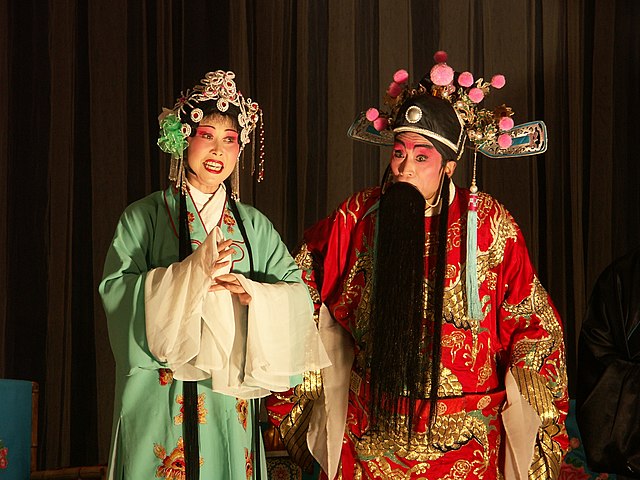Huangmei Opera or Huangmei tone is a form of Chinese opera originating from [Huangmei county,Hubei province]] as a form of rural folk song and dance. It is also referred to as Anhui Opera. It has been in existence for the last 200 years and possibly longer. Huangmei opera is one of the most famous and mainstream opera in China, and is a class of the typical Anhui opera. The original Huangmei opera was sung by women in Huangmei county areas when they were picking tea, and the opera was called the Picking Tea Song. In the late Qing dynasty, the songs were popular in Anhui Huaining County adjacent regions, combined with the local folk art, Anqing dialect with singing and chants, and gradually developed into a newborn's operas. The music is performed with a pitch that hits high and stays high for the duration of the song. It is unique in the sense that it does not sound like the typical rhythmic Chinese opera. In the 1960s Hong Kong counted the style as much as an opera as it was a music genre. Today it is more of a traditional performance art with efforts of revival in mainland China, Hong Kong, and Taiwan, and mostly sung in Mandarin. In 2006, Huangmei Opera was selected for the first batch of China's national intangible cultural heritage.

Huangmei opera performance in Shanghai, featuring two female performers
Informal performance of Huangmei opera
Chinese Opera is a form of theatre in China that combines singing, acting, and elaborate costumes. Topics are based on Chinese history, mythology, and literature. Over its historical evolution, it has incorporated various art forms such as music, song and dance, martial arts, acrobatics, costume and make-up art, and literature. It has highly formalized roles, performed by professional actors each trained for specific roles. Exaggerated features and colors make the roles easily identifiable.
A Shao opera performance in Shanghai, China, 2014. This photo shows an acrobatic performer's somersault.
12th century painting by Su Hanchen; a girl waves a peacock feather banner like the one used in Song dynasty dramatical theater to signal an acting leader of troops
Theatre play, Prosperous Suzhou by Xu Yang, 1759
Sichuan opera in Chengdu






